Life Sciences News
See our Latest Journal Publications
Dr Corinne Smith awarded Royal Society Leverhulme Trust Senior Research Fellowship
 Dr Corinne Smith has been awarded a Royal Society Leverhulme Trust Senior Research Fellowship for her project entitled "defining clathrin network interactions using advanced cryo-electron microscopy". The Fellowship will enable Dr Smith to spend a year away from teaching in order to focus on her research activities.
Dr Corinne Smith has been awarded a Royal Society Leverhulme Trust Senior Research Fellowship for her project entitled "defining clathrin network interactions using advanced cryo-electron microscopy". The Fellowship will enable Dr Smith to spend a year away from teaching in order to focus on her research activities.
Next step towards preventing cancer and Alzheimer's
 Dr Ioannis Nezis has led a research team to identify, and create a database of, the proteins needed for an essential cellular process, autophagy, which keeps our bodies healthy, but which declines as we age.
Dr Ioannis Nezis has led a research team to identify, and create a database of, the proteins needed for an essential cellular process, autophagy, which keeps our bodies healthy, but which declines as we age.
Better understanding of how these proteins work could lead to the development of drugs to stop this decline, and keep cells healthy for longer - thus preventing major age-related conditions, such as cancer, Crohn’s disease, neurodegenerative conditions, as well as viral and bacterial infections.
New IGGY Life Sciences Pages
The new IGGY Life Sciences pages go live today with a competition for IGGY members. Winners will receive free tickets to New Scientist Live.
For a short period the pages are open for non-members to view.
Need more information about IGGY?
Warwick Crop Centre Joins Historic Tractor Parade
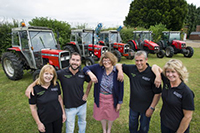 Staff and students from Warwick Crop Centre took part in the ‘70 tractors for 70 years’ Massey Ferguson procession organised by Coventry Transport Museum on Saturday 30 July.
Staff and students from Warwick Crop Centre took part in the ‘70 tractors for 70 years’ Massey Ferguson procession organised by Coventry Transport Museum on Saturday 30 July.
Life Sciences Graduation 2016
Congratulations to all our Life Sciences students who graduated today.
Unique Herbicide Binding Pattern discovered via Dow Agrosciences and University of Warwick collaboration
 Synthetic auxin herbicides have played an important role in weed management for decades with a highly effective yet complex mode of action. Dow AgroSciences collaborated with the University of Warwick to discover unique attributes of this important class of herbicides. The research highlighted receptor-binding uniqueness of Dow AgroSciences’ new arylpicolinate herbicides, including Arylex™ active and Rinskor™ active, compared to other commercial auxin herbicides.
Synthetic auxin herbicides have played an important role in weed management for decades with a highly effective yet complex mode of action. Dow AgroSciences collaborated with the University of Warwick to discover unique attributes of this important class of herbicides. The research highlighted receptor-binding uniqueness of Dow AgroSciences’ new arylpicolinate herbicides, including Arylex™ active and Rinskor™ active, compared to other commercial auxin herbicides.
Professor Richard Napier, from the School of Life Sciences, was the key cooperator who identified these unique differences. The way auxin herbicides bind to receptors in plant cells alters plant growth in susceptible species, leading to weed control.
Funding Success - UK-China AMR Partnership Initiative
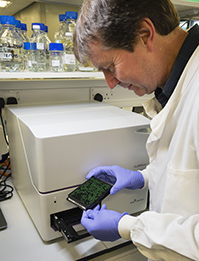 Accelerate CHNUK is a transnational drug discovery programme led in the UK by the University of Warwick (Professor Chris Dowson). The teams aim to deliver new antimicrobial leads using fragment based lead discovery (FBLD).
Accelerate CHNUK is a transnational drug discovery programme led in the UK by the University of Warwick (Professor Chris Dowson). The teams aim to deliver new antimicrobial leads using fragment based lead discovery (FBLD).
How viruses might influence estimates of global warming
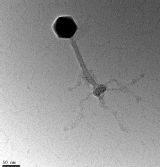 The tiniest life forms on Earth have a big impact on the way carbon dioxide is cycled between the atmosphere and the ocean, new research from the University of Warwick has found.
The tiniest life forms on Earth have a big impact on the way carbon dioxide is cycled between the atmosphere and the ocean, new research from the University of Warwick has found.
These life forms are viruses of some of the most abundant organisms on our planet: marine cyanobacteria.
The new research, Viruses Inhibit CO2 Fixation in the Most Abundant Phototrophs on Earth and published by Current Biology, demonstrates that the viruses of these cyanobacteria, cyanophages, use these genes to maintain the so-called “light-reactions” of photosynthesis, while shutting down the “dark-reactions”.
Cyanobacteria have had an incredible impact on the Earth by seeding the atmosphere with oxygen about 3 billion years ago, allowing for the existence of life as we know it. Today, this same process that acts to produce oxygen sucks up CO2 from the atmosphere.
Professor David Scanlan of the University of Warwick’s School of Life Sciences, the lead author of the research, said: “CO2 is a key greenhouse gas directly implicated in global warming. Given CO2 is converted into organic compounds during photosynthesis, factors that directly affect this process play a key role in modulating atmospheric CO2 levels.”
“We have known about these viruses for several decades” said Scanlan. “Things changed in 2003 when we discovered that these viruses have stolen genes from cyanobacteria that participate in photosynthesis. Now we have shown that these viruses modify photosynthesis during the demise of their host”.
On a global scale this results in losses of 0.02-5.39 Pg C yr-1 to viral induced inhibition of CO2 fixation. Per annum this upper figure is approximately 10% of the total CO2 fixed in the marine environment.
This data has important implications for measuring greenhouse gasses. Professor Scanlan explains:
“Quantification of net primary productivity is usually determined by directly measuring cyanobacterial photosynthesis and these methods rely on the coupling of light reactions to CO2 fixation”.
“In virus infected cells, this assumption of light reactions linked to CO2 fixation is incorrect and can therefore lead to a significant over estimation of CO2 fixation. This has very important implications for our understanding, and the estimates of, global warming.”
Contacts:
Professor Dave Scanlan
Email:
Tel: + 44 24 76 528363
Dr Andrew Millard
Email: Andrew.Millard@warwick.ac.uk
Tel: + 44 24 76 523589
The Elizabeth Creak Charitable Trust and the School of Life Sciences
The School of Life Sciences welcomes Professor Murray Grant, who recently took up the position of Elizabeth Creak Chair in Food Security and, thanks to a generous donation from the Elizabeth Creak Charitable Trust, researchers teach children about soil at the Kenilworth Show.
Plants remember stress to help protect themselves
A new generation of plants better adapted to mitigate the effects of environmental change could be created following a fundamental step towards understanding how plants are able to retain a memory of stress exposure.
The research, led by Dr Jose Gutierrez-Marcos and published in the journal eLife, provides the first compelling evidence that plants have evolved ways to remember previous exposures to stress, in this case high salinity conditions, which can help subsequent progenies withstand the same stress in future.
University of Warwick honoured at Accreditation Awards Ceremony for Bioscience Degrees
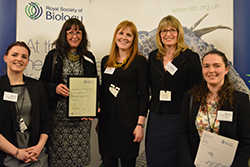 The University of Warwick has been formally awarded Advanced Accreditation for eight degree programmes by the Royal Society of Biology at the 2016 awards ceremony. The fourth annual awards, presented at the House of Commons on Thursday 14 April, recognised bioscience degree programmes which promote academic excellence, and prepare graduates for employment within the biosciences.
The University of Warwick has been formally awarded Advanced Accreditation for eight degree programmes by the Royal Society of Biology at the 2016 awards ceremony. The fourth annual awards, presented at the House of Commons on Thursday 14 April, recognised bioscience degree programmes which promote academic excellence, and prepare graduates for employment within the biosciences.Selection pressures push plants over adaption cliff – new study has significant implications for how we address rapid climate change
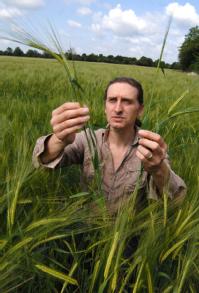 New simulations by researchers at the University of Warwick and UCL’s Institute of Archaeology of plant evolution over the last 3000 years have revealed an unexpected limit to how far useful crops can be pushed to adapt before they suffer population collapse. The result has significant implications for how growers, breeders and scientists help agriculture and horticulture respond to quickening climate change.
New simulations by researchers at the University of Warwick and UCL’s Institute of Archaeology of plant evolution over the last 3000 years have revealed an unexpected limit to how far useful crops can be pushed to adapt before they suffer population collapse. The result has significant implications for how growers, breeders and scientists help agriculture and horticulture respond to quickening climate change.
The research led by Professor Robin Allaby from the School of Life Sciences has just been published in the journal Evolutionary Genomics and is entitled "Evolutionary Genomics Surprisingly Low Limits of Selection in Plant Domestication".
Read the full Press Release
School of Life Sciences hosts British Biology Olympiad finals 4-6 April
Sixteen of the country’s best young biologists came to the University of Warwick this week for the British Biology Olympiad (BBO) finals; organised by the Royal Society of Biology and sponsored by BBSRC. The students had been selected through three rounds of examinations from more than 7,200 secondary school applicants.
The British Biology Olympiad final practical training programme in the School of Life Sciences was organised by Dr Leanne Williams and Dr Kevin Moffat, with Dr Miriam Gifford and Dr Logan Kistler. The students faced intensive high-level practicals covering a huge range of topics: animal anatomy, systemics and evolution, biochemistry and molecular biology, plant morphology, taxonomy and physiology. Their skills were assessed the following day with exams in the lab, and together with theory exams in the evening, an Olympiad team of 4 students was selected. Teaching was supported by the professional and enthusiastic Life Sciences lab technical team, who rapidly turned around the labs during the quick-fire four-course banquet of practicals and exams!
Details of the participating students and the winning team that will complete in the International Biology Olympiad in Vietnam this summer can be seen at British Biology Olympiad results
In July 2017 the University of Warwick in partnership with the Royal Society of Biology will host the International Biology Olympiad (IBO). This is a week-long biology competition for 16/17 year-olds which brings together winners of the National Biology Olympiads from over 60 countries. The School of Life Sciences will be involved in the practical and theory components of the competition utilising our excellent facilities and biological expertise.
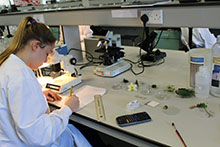 |
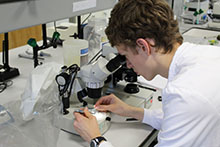 |
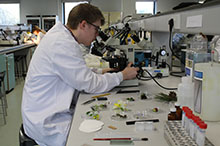 |
Matt Teft is part of winning team at Warwick Staff Awards
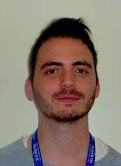 Matt Teft, a second year MIBTP (Midlands Integrative Biosciences Training Partnership) student, is part of a team that has won an award for Public Engagement at the University of Warwick Staff Awards.
Matt Teft, a second year MIBTP (Midlands Integrative Biosciences Training Partnership) student, is part of a team that has won an award for Public Engagement at the University of Warwick Staff Awards.
The MIBTP is a BBSRC funded Doctoral Training Partnership between the Universities of Warwick, Birmingham and Leicester. As part of their training, the BBSRC requires students to complete a Professional Internship for Phd Students (PIPS). Matt participated in the University's activities at the Cheltenham Science Festival in June 2015 as part of his PIPS and has written a blog of his experience: blogs.warwick.ac.uk/mibtp/entry/cheltenham_science_festival
Matt is a PhD student with Dr Miriam Gifford in the School of Life Sciences working on a project entitled 'Investigating conservation of function of SCARECROW-LIKE/GRAS transcription factors and their interactions in controlling root architecture responses'.
IFSTAL Away Day Success
On Saturday 5 March, Oxford University hosted the first IFSTAL (Innovative Food Systems Teaching and Learning) Away Day, where students from Warwick, Reading, Oxford, City and LCIRAH were able to meet and network with fellow students and food sector professionals, including Gavin Milligan – Group Sustainability Director at William Jackson Food and Angela Baker – Deputy Director, Health and Wellbeing, Public Health England. Two Masters students and two PhD students from the School of Life Sciences were involved in the day, presenting their own research and working with others to solve ‘real’ workplace scenarios in a relaxed and fun environment.
IFSTAL is an interactive training programme designed to improve postgraduate knowledge and understanding of the food system through numerous activities and events throughout the year, as well as an interactive Moodle site.
Want to get involved? To join you must be a postgraduate registered at Warwick University (or one of our partner institutes), although some events will be open to all.
Email Kelly Reed at IFSTAL-Warwick@Warwick.ac.uk to be put on the mailing list.
Alternatively find us on Facebook, Moodle and Twitter – simply search for IFSTAL.
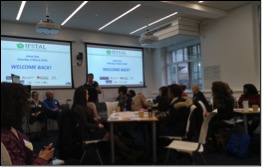 |
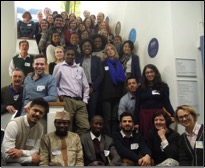 |
Summer research placements in Entomology and Pathology
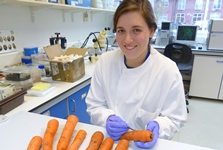 The School of Life Sciences has a number of summer research placements available in Entomology and Plant Pathology during the summer vacation of 2016. The placements are funded by the BBSRC through its Strategic Training Awards for Research Skills (STARS) scheme and provide training in strategically important and vunerable skills for bioscientists.
The School of Life Sciences has a number of summer research placements available in Entomology and Plant Pathology during the summer vacation of 2016. The placements are funded by the BBSRC through its Strategic Training Awards for Research Skills (STARS) scheme and provide training in strategically important and vunerable skills for bioscientists.
The 10-week placements are for second year undergraduate students enabling them to join a research group in Life Sciences and undertake a small research project related to the group's activities.
Each student will receive a bursary of £2000 (£200 per week).
For further details and how to apply see the Summer research placements flyer (pdf).
The closing date for applications is 18 April.
BBSRC Press Release 'First STARS awards target vunerable skills in the life sciences'
SLS authors publish new edition of 'Introduction to Modern Virology'
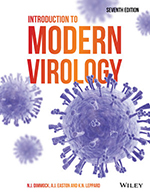 The new 7th edition of the popular textbook ‘Introduction to Modern Virology’ is published today.
The new 7th edition of the popular textbook ‘Introduction to Modern Virology’ is published today.
First published in 1974, this was one of the first textbooks in the field of virology. Authored by academics from the School of Life Sciences, the purpose of the book was and remains to provide a clear and comprehensive coverage of virology at a level accessible for undergraduates. It provides a broad introduction to virology, which includes the nature of viruses, the interaction of viruses with their hosts and the consequences of those interactions that lead to the diseases we see.
The latest edition, authored by Professor Nigel Dimmock, Professor Andrew Easton and Dr Keith Leppard, has been updated throughout to cover the ever growing subject area. The book includes new chapters focusing on the economic impact of virus infections and the impact that viruses have on the planet.
The text provides ideal reading for students in biology and medicine wishing to study virology.
Dr Leppard said, “the book underpins teaching of the subject to our undergraduates in Medical Microbiology and Virology, and Biomedical Science.”
Related links:
Introduction to Modern Virology, 7th Edition
BSc Biomedical Science
BSc Medical Microbiology and Virology
Professor Nicholas Dale receives MRC Discovery Award
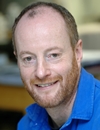 Innovative University of Warwick research will be accelerated thanks to funding from the Medical Research Council (MRC) to take ground-breaking ideas into industry and out to patients. A Discovery Award of £973k will support vivo microscopy researchers investigate the dynamic activity of individual neural cells during complex behaviours.
Innovative University of Warwick research will be accelerated thanks to funding from the Medical Research Council (MRC) to take ground-breaking ideas into industry and out to patients. A Discovery Award of £973k will support vivo microscopy researchers investigate the dynamic activity of individual neural cells during complex behaviours.
Led by Professor Nicholas Dale, researchers will investigate the activity of neural cells deep in the mammalian brain that help control complex behaviours such as feeding and breathing and the operation of the body’s circadian clock.
Dr Elizabeth Fullam wins Seed Grant Award to study Mycobacterium tuberculosis
 Dr Elizabeth Fullam has been awarded a seed grant of £25k from the Warwick Quantitative Biomedicine Programme (funded through the Wellcome Trust Institutional Strategic Support Fund). In a programme open to all Warwick researchers, seed grants are provided through an open, peer reviewed competition to explore quantitative biology in all areas of modern biology. Dr Fullam's project aims to quantify nutrient uptake and metabolism in Mycobacterium tuberculosis and will fund a postdoctoral researcher for 6 months.
Dr Elizabeth Fullam has been awarded a seed grant of £25k from the Warwick Quantitative Biomedicine Programme (funded through the Wellcome Trust Institutional Strategic Support Fund). In a programme open to all Warwick researchers, seed grants are provided through an open, peer reviewed competition to explore quantitative biology in all areas of modern biology. Dr Fullam's project aims to quantify nutrient uptake and metabolism in Mycobacterium tuberculosis and will fund a postdoctoral researcher for 6 months.
Tuberculosis (TB) caused by Mycobacterium tuberculosis (Mtb) is a major global health problem, with the World Health Organisation reporting 9 million new cases of TB and 1.5 million deaths from TB in 2014 alone. It is estimated that one-third of the world’s population is latently infected with Mtb and Mtb is unique in its ability to be able to survive within the human host for decades.
Currently there is a lack in our understanding of the nutrients that Mtb is able to utilise to survive intracellularly. The aim of this Quantitative Biomedical Seed Grant is to utilise advanced imaging techniques to enable us to understand and quantify these essential nutrient uptake and metabolism processes in this pathogenic organism.
Research Fellow vacancy - apply by 16 February 2016
SBRI funding received to develop diagnostic biosensors for strokes
Sarissa Biomedical, a spin-out company established by Professor Nick Dale, Ted Pridgeon Professor of Neuroscience in the School of Life Sciences, has been awarded £150,000 from Innovate UK’s Small Business Research Initiative (SBRI). Sarissa Biomedical has pioneered highly sensitive analytical devices known as microelectrode biosensors, which can be used to monitor in real-time the levels of purines - neurochemicals that influence the function of the nervous system. These biosensors have been used to demonstrate that purines are elevated in the blood of stroke patients compared to healthy controls.
Stroke is one of the leading causes of death and disability in the UK – in 2010 there were an estimated 150,000 strokes and 50,000 deaths attributable to stroke. Stroke currently costs the UK economy approximately £9billion per year in health and social care costs. Rapid treatment of ischaemic strokes to remove the blockage of cerebral circulation can allow perfect recovery and avoid lasting disability. On average for every 15 minutes saved in the period from stroke onset to the provision of treatment, one extra month of disability-free life is achieved. Point-of-care tests that can detect stroke from its earliest moments would help to shorten treatment delays and ensure that as many patients as possible receive treatment.
The SBRI funding will enable the project team to develop the biosensor technology into a prototype diagnostic device for strokes that can be used by paramedics. It will also support the analysis of the stroke clinical pathway to determine how the device can be used most effectively, and it will allow the design of a large-scale clinical trial involving paramedics and ambulance staff across the UK. Deployment of this test with paramedics will allow speedier identification of stoke victims at the point of injury, and facilitate rapid coordination of the clinical treatment pathway to maximise the chances of the best possible patient outcomes.
